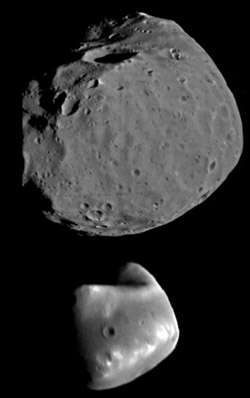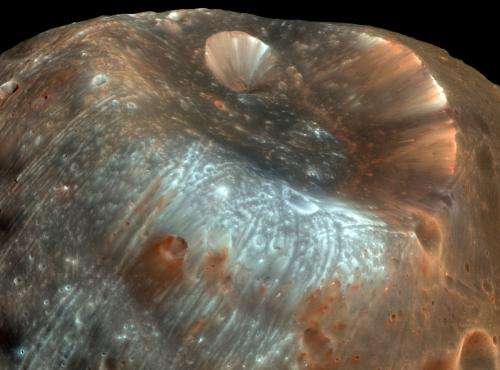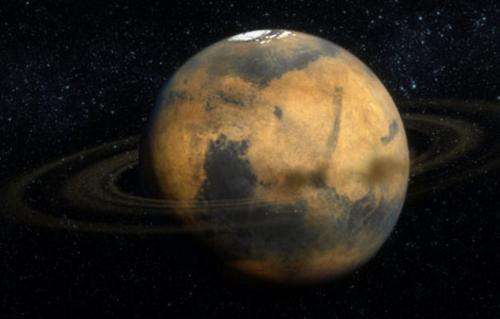Is Phobos doomed?

"All these worlds are yours except Europa, attempt no landing there."
As much as I love Arthur C. Clarke and his books, I've got to disagree with his judgement on which moons we should be avoiding. Europa is awesome. It's probably got a vast liquid ocean underneath its icy surface. There might even be life swimming down there, ready to be discovered. Giant freaky Europa whales or some kind of alien sharknado. Oh man, I just had the BEST idea for a movie.
So yea, Europa's fine. The place we should really be avoiding is the Martian Moon Phobos. Why? What's wrong with Phobos? Have I become some kind of Phobo…phobe? Is there any good reason to avoid this place?
Well first, its name tells us all we need to know. Phobos is named for the Greek god of Horror, and I don't mean like the usual gods of horror as in Clive Barker, John Carpenter or Wes Craven, I mean that Phobos is the actual personification of Fear… possibly with a freaky lion's head. And… there's also the fact that Phobos is doomed.
Literally doomed. Living on borrowed time. Its days are numbered. It's been poisoned and there's no antidote. It's got metal shards in its heart and the battery on it's electro-magnet is starting to brown out. More specifically, in a few million years, the asteroid-like rock is going to get torn apart by the Martian gravity and then get smashed onto the planet.
It all comes down to tidal forces. Our Moon takes about 27 days to complete an orbit, and our planet takes around 24 hours to complete one rotation on its axis. Our Moon is pulling unevenly on the Earth and slowing its rotation down.
To compensate, the Moon is slowly drifting away from us. We did a whole episode about this which we'll link at the end of the episode. On Mars, Phobos only takes 8 hours to complete an orbit around the planet. While the planet takes almost 25 hours to complete one rotation on its axis. So Phobos travels three times around the planet for every Martian day. And this is a problem.
It's actually speeding up Mars' rotation. And in exchange, it's getting closer and closer to Mars with every orbit. The current deadpool gives the best odds on Phobos taking 30 to 50 million years to finally crash into the planet. The orbit will get lower and lower until it reaches a level known as the Roche Limit. This is the point where the tidal forces between the near and far sides of the moon are so different that it gets torn apart. Then Mars will have a bunch of teeny moons from the former Phobos.
And then good news! Those adorable moonlets will get further pulverized until Mars has a ring. But then bad news… that ring will crash onto the planet in a cascade of destruction to be described as "the least fun balloon drop of all time". So, you probably wouldn't want to live on Mars then either.

Count yourself lucky. What were the chances that we would exist in the Solar System at a time that Phobos was a thing, and not a string of impacts on the surface of Mars.
Enjoy Phobos while you can, but remember that real estate there is temporary. Might I suggest somewhere in the alien sharknado infested waters of Europa instead?

What do you think. Did Arthur C Clarke have it wrong? Should we explore Europa?
And if you like what you see, come check out our Patreon page and find out how you can get these videos early while helping us bring you more great content!
Source: Universe Today





















